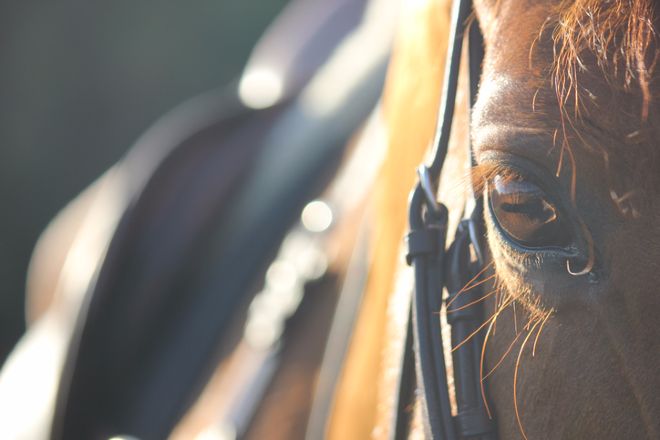Article by Julie Hoover, Charles E. Smith Jewish Day School
This article originally appeared in the November/December 2015 Net Assets.
“There is something about the outside of a horse that is good for the inside of a man.”
—Winston Churchill
Hear, hear, Sir Winston. Although my everyday concerns about enrollment and net tuition revenue are minuscule in comparison to guiding a nation through a world war, I’ve no doubt that the restorative power of time spent with horses aided him as it does me.
Something in the relationship of human and horse leaves little room for outside influences. Horses are acutely attuned to their humans and live entirely in the moment. Perhaps this draws our focus in return. Or perhaps it is innate self-protection; after all, this creature that so willingly partners with humans is a thousand-pound prey animal with large teeth and hooves. An unfocused human runs risk of injury.
Whatever the reason, the magical power of horses materializes when you open the pasture gate. Bright eyes and perked ears watch you, asking “What are we doing today?” Soft breath tickles your neck. Horses always have sweet breath, except for when they eat onion grass. In the barn, the repetitive motion of brushing a sleek hide soothes both human and horse. By the time you complete the orderly ritual of tacking up for your ride, the trials of the day are gone.
In my riding hours I find that two endeavors, nearly opposites on the riding spectrum, are particularly gratifying. A trail ride through fields and woods after a long day is an ideal way to recharge. I built my relationship with my horse Lightning on such rides. He came to me as a failed young racehorse in need of a new career, and needing also to learn how to relax in the natural world outside of the racing barn and track. Fortunately Lightning is naturally brave and curious, and he quickly learned the joys of wandering shady trails, splashing through streams, and watching for the deer and raccoons that sometimes cross our path.
Cross country [riding] is an acutely tuned partnership that for a fast few minutes turns me into a superhero, running faster and jumping higher than any mere human.
My other favorite riding activity could hardly be more different from a lazy trail ride. Galloping. Jumping. Speed. Reflexes. Cross country is an acutely tuned partnership that for a fast few minutes turns me into a superhero, running faster and jumping higher than any mere human. Riding a horse over fences through the countryside, over rolling green fields under brilliant sunshine, is a challenge and adrenaline rush beyond compare. The afterglow lasts for days.
Lucky for me, there is an equestrian sport called “eventing,” with roots in cavalry training, that offers regular opportunities to indulge in cross-country jumping. Eventing is a horsey triathlon, its three phases consisting first of dressage, a prescribed pattern demonstrating the horse’s obedience and suitability; then stadium jumping, a course of jumps in an arena that show the horse’s athletic talent and adjustability; and finally, the phase that all “eventers” live for, cross-country jumping. Most of us tolerate dressage and stadium jumping intent on getting to the fun part. The first two phases really just demonstrate that (1) your horse is trained at least well enough not to kill you, and (2) has enough coordination and fitness not to trip over the big solid cross country fences and kill you.
The months and years of training required to develop an event horse, ride by ride, skill by skill, are entirely engaging and rewarding. It all comes together when you enter the start box before a cross-country ride. Your horse’s ears flick back and forth, from you to the course ahead, awaiting the starter’s countdown: “Five, four, three, two, one: Have a great ride.” He feels your signal to go, locks his attention on the first fence and gallops ahead. Every stride, every turn, jump and hill, you move together.
I find time to ride regardless of the hectic pace at work, because riders must ride. One might as well tell us not to breathe as not to ride. We don’t think consciously about that need. It just is. Late nights at the barn, early weekend mornings, we find the time. No doubt my colleagues reap the collateral benefits. Sir Winston’s favorite pastime makes for a positive, happy leader.



